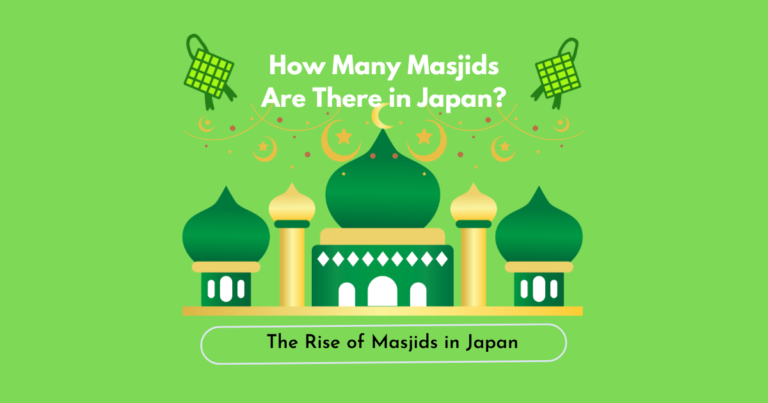Japan, with its unique blend of ancient traditions and modern innovation, has emerged as an increasingly popular travel destination among Muslim travelers. With the rising demand for halal food options and culturally inclusive amenities, Japan is making significant strides in becoming more Muslim-friendly. For Muslim travelers and residents alike, having access to masjids (mosques) for daily prayers and community gatherings is crucial.
If you’re planning a trip to Japan or just curious about how accommodating the country is for Muslim travelers, one question often arises—how many masjids are there in Japan? This article explores the growing presence of masjids in Japan, the facilities they offer, and tips for Muslim travelers, along with a helpful data table to summarize key information.
Table of Contents
The Rise of Masjids in Japan
Over the past few decades, Japan has seen a steady increase in its Muslim population due to international students, expatriates, and tourists. To accommodate this growing demographic, the number of masjids in Japan has risen significantly. There are approximately 90 masjids operating across Japan, catering to the diverse Muslim community. These range from large, purpose-built Islamic centers to smaller community masjids.
Most masjids in Japan are located in major cities such as Tokyo, Osaka, and Kyoto, where there are larger concentrations of Muslim residents and tourists.
Key Masjids in Japan’s Major Cities
Tokyo
Tokyo, the bustling capital of Japan, is home to some of the largest and most notable masjids in the country:
- Tokyo Camii: This is the largest and most famous mosque in Japan, located in Shibuya. Built with stunning Ottoman-style architecture, it also serves as a cultural center. Visitors often highlight its welcoming atmosphere and availability of halal food in nearby areas.
- Dar Al-Arqam Masjid (Ueno): Located near the tourist-heavy area of Ueno, this masjid serves both travelers and locals looking for a convenient place to offer prayers.
Osaka
Osaka is another hub for Muslim-friendly accommodations and prayer spaces:
- Osaka Mosque (Osaka Islam Center): A key masjid in the region, offering prayer facilities, Islamic lectures, and community events.
- Ibaraki Mosque (Osaka Suburb): This masjid is located in the suburb of Ibaraki and is frequented by local Muslim families.
Kyoto
Although Kyoto is smaller in size compared to Tokyo and Osaka, it remains a favorite destination for tourists due to its cultural landmarks. Kyoto is also home to:
- Kyoto Masjid: Centrally located, making it accessible to tourists visiting the city’s heritage sites.
Other Noteworthy Locations
- Kobe Mosque (Hyogo): Established in 1935, Kobe Mosque holds the distinction of being the oldest mosque in Japan. Its rich history and architectural charm attract both worshippers and tourists.
- Fukuoka Mosque (Fukuoka): For those in southern Japan, Fukuoka Mosque provides essential facilities for worship and community events.
Data Table of Masjids in Japan
To give you a clearer picture, here’s an overview of some key masjids across Japan:
| City | Masjid Name | Special Features | Nearby Halal Food Options |
|---|---|---|---|
| Tokyo | Tokyo Camii | Largest masjid, Ottoman-style architecture | Yes—multiple halal restaurants |
| Osaka | Osaka Islam Center | Regular prayer services, Islamic lectures | Nearby halal grocery stores |
| Kyoto | Kyoto Masjid | Accessible from tourist attractions | Limited options nearby |
| Kobe | Kobe Mosque | Oldest masjid in Japan, historical landmark | Nearby halal cafes |
| Fukuoka | Fukuoka Mosque | Central location in southern Japan | Halal-certified eateries nearby |
What Facilities Do Masjids in Japan Typically Offer?
While services depend on the size and location of the masjid, here’s what you can typically expect:
- Prayer Areas: Separate spaces for men and women are common in Japanese masjids.
- Wudu (Ablution) Facilities: Clean and accessible areas for performing wudu are provided in most masjids.
- Community Events: Masjids in larger cities often host Quran study sessions, Jummah prayers, and cultural events.
- Halal Food Accessibility: Many masjids are located near halal food outlets or offer guidance to nearby halal-certified restaurants.
FAQs about How Many Masjids Are There in Japan?
Are there enough masjids in Japan for Muslim travelers?
While Japan’s masjid numbers are still relatively small compared to countries with larger Muslim populations, cities like Tokyo, Osaka, and Kyoto are well-equipped to cater to Muslim travelers. Additionally, prayer spaces in airports, malls, and some tourist attractions bridge the gap for those exploring areas with fewer masjids.
What should I know before visiting a masjid in Japan?
- Respect the local customs and guidelines of the masjid.
- Dress modestly when entering a masjid.
- Check prayer timings in advance, as they may differ slightly based on location.
Are there prayer spaces outside masjids in Japan?
Yes, many airports, shopping malls, and even popular tourist spots now offer prayer rooms for Muslims. These spaces are equipped with mats and qibla directions for added convenience.
How can I find the nearest masjid when traveling in Japan?
Apps like Halal Navi and Muslim Pro are excellent for finding nearby masjids, halal restaurants, and prayer spaces.
Does Japan have a growing halal food scene?
Yes, halal food options in Japan have expanded significantly. From ramen shops in Tokyo to yakiniku in Osaka, Muslim travelers can now enjoy authentic Japanese cuisine without hesitation.
Why the Growing Number of Masjids in Japan Matters
The growing number of masjids in Japan is a testament to the country’s efforts to become more inclusive and accessible to Muslims around the world. By providing prayer facilities and promoting halal-friendly services, Japan invites Muslim travelers to fully experience the richness of its culture and heritage.
If you’re planning to visit Japan, knowing where masjids are located can make your trip far more convenient and enjoyable. And as a Halal food enthusiast, you’ll be glad to know that the country’s dedication to inclusivity extends to its culinary scene too.
